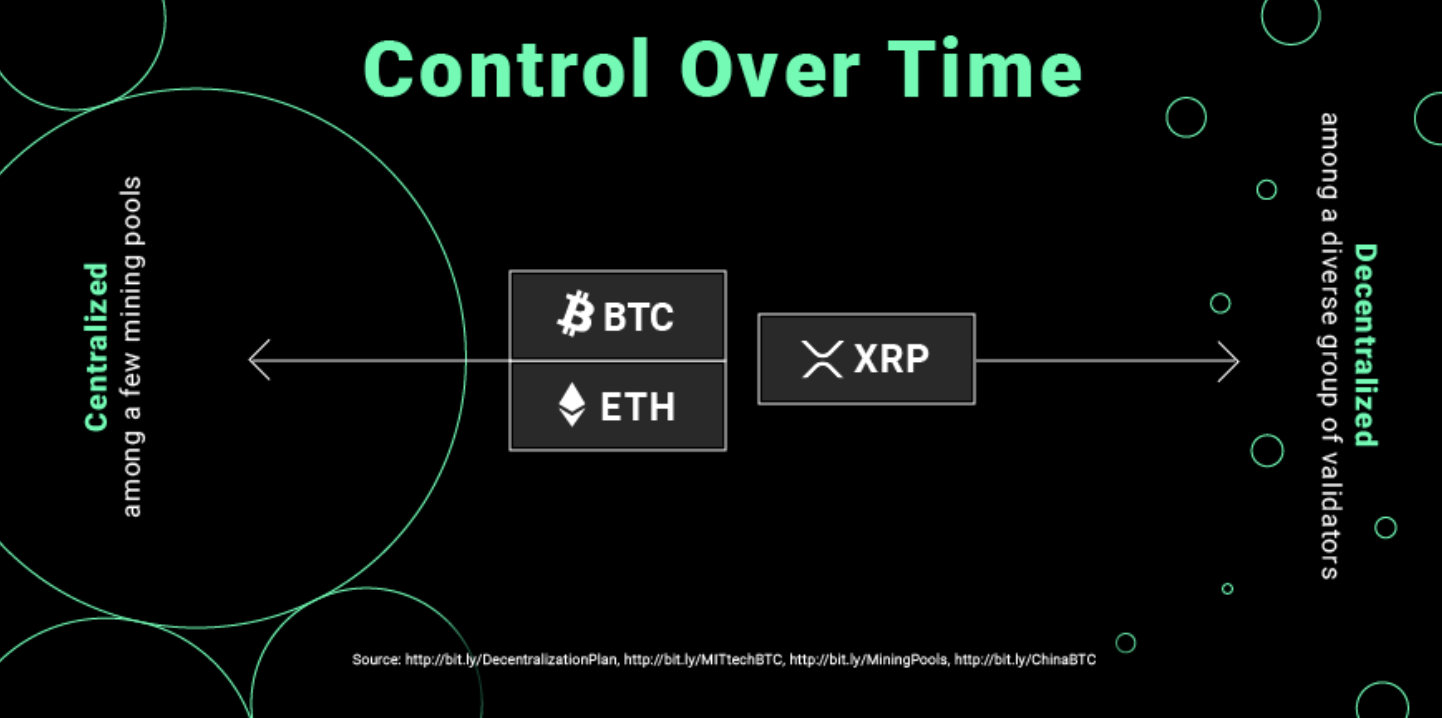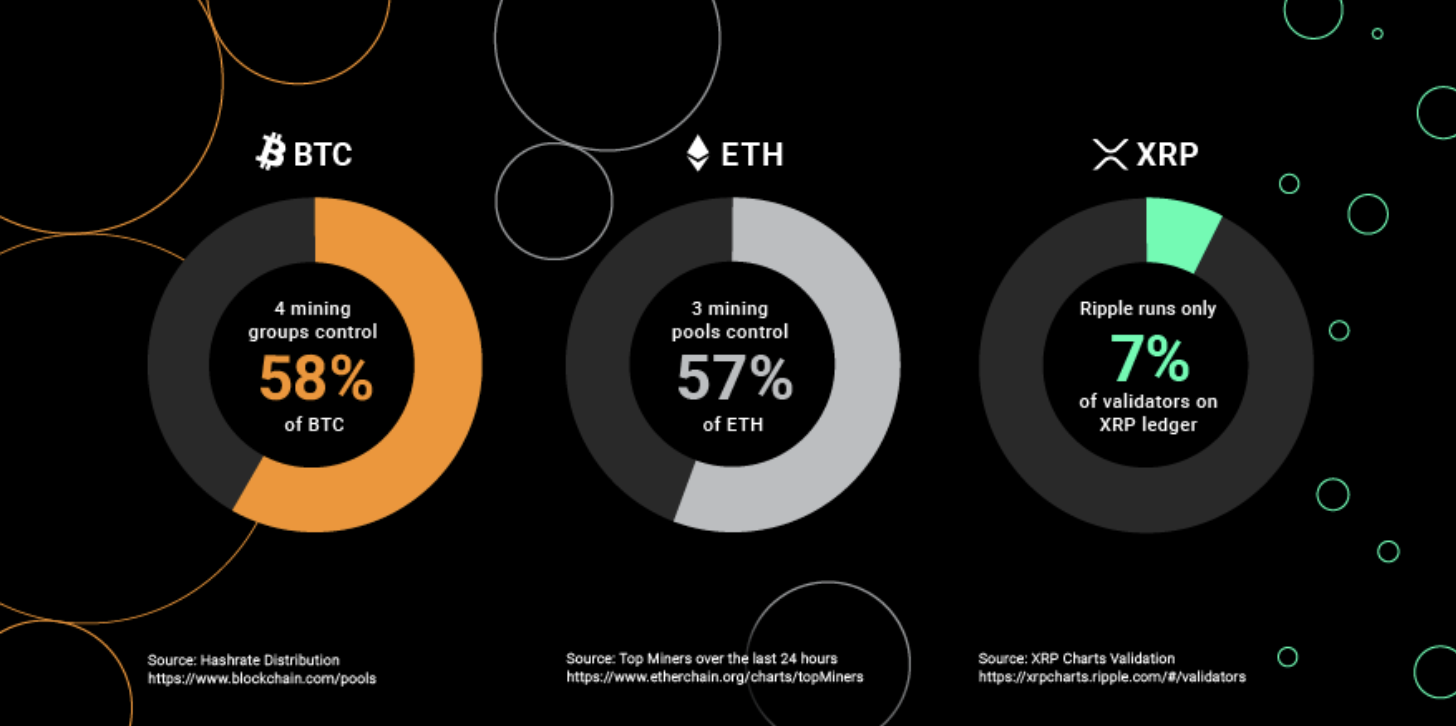
Ripple Labs, Inc is big on decentralization right now. Stung by criticism that XRP is a centralized currency, and the very real risk that an ongoing lawsuit could see it ruled a security, Ripple has been on the offensive. Its latest effort to disambiguate Ripple the company and ripple the coin has seen Chief Technology Officer David Schwartz pen a treatise on “The Inherently Decentralized Nature of XRP Ledger”. It makes some bold claims.
Also read: Ripple Wants People to Stop Calling Its Coin ‘Ripple’
Ripple: More Decentralized Than Bitcoin and Ethereum?
Decentralization has become something of a stick for cryptocurrency purists to prod one another with. Ever since the SEC declared that ethereum doesn’t constitute a security because it is now “sufficiently decentralized”, other altcoin projects have spotted a way out. Through achieving the holy grail of full decentralization, so the theory goes, it ought to be possible to escape censure from regulators. Ripple has come in for particular scrutiny on this count due to the fact that the majority of all ripple coins are held by the company. While it has been making efforts to disburse these through business partnerships and charitable initiatives, it could be decades before Ripple owns a minority stake of its coin.

The billions of XRP in the Ripple vaults, and the possibility that this could deem the cryptocurrency a security, is believed to be a deciding factor in Coinbase declining to list the token. Coupled with the ongoing class action lawsuit that ought to determine whether or not ripple is a security, and the company has every reason to push the decentralization narrative. “The Inherently Decentralized Nature of XRP Ledger” is a provocatively named piece from Ripple’s CTO that lays out the case for the separation of coin and company. In it he asserts:
While Bitcoin and Ethereum are becoming more centralized over time, the XRP Ledger is getting more decentralized.
The Quest to Decentralize Ripple
A lot of the arguments revolving around ripple’s decentralization, or lack thereof, stem from Jackson Palmer’s well-intentioned Are We Decentralized Yet? website. It tracks metrics such as the percentage of money held by the top 100 accounts (19% for BTC versus 81% for XRP) and the number of public nodes. As Jackson Palmer would concede, though, his site is not intended to serve as a rubric for defining decentralization; rather it is a tool for highlighting the distribution of power and control in cryptocurrency projects.

“The XRP Ledger is and always has been inherently decentralized because the users always retain the freedom to change their UNLs and the corresponding validators that they trust,” argues Schwartz. He also claims that “Ripple’s validators do not wield meaningful power over the XRP Ledger.” This goes against independent research performed by Bitmex Research that found:
Since the keys were all downloaded from the Ripple.com server, Ripple is essentially in complete control of moving the ledger forward, so one could say that the system is centralised.
Ripple Has Many Properties but Decentralization Probably Isn’t One
Even Ripple’s fiercest critics would concede that the company and its eponymous coin have many positive attributes. Ripple is fast to send, has extremely low fees, and the company has been praised for its meticulous transparency reports that shed light on its performance over the previous quarter. There’s also Ripple’s Xrapid settlement solution that may have useful applications for international money transfer, particularly when switching between foreign currencies.

At the start of January, David Schwartz stated that increasing ripple’s decentralization was his “number one priority for 2018”. It’s a laudable goal to pursue, for many reasons. His assertion that ripple is more decentralized than bitcoin or ethereum, however, has been met with incredulity. Schwartz’s argument that PoW coins are becoming more centralized due to the increasing power of mining pools is disingenuous, as there are many other factors that make the likes of bitcoin decentralized. Not having a CEO or CTO who can be hauled up in court any time an investor loses their shirt is one of them.
“It’s very clear to me that XRP’s not a security,” said Ripple CEO Brad Garlinghouse in a livestreamed AMA last night. With the class action lawsuit gathering steam, we shouldn’t have to wait long to find out.
Do you think ripple is more decentralized than bitcoin? Let us know in the comments section below.
Images courtesy of Shutterstock, Ripple, and Twitter.
Need to calculate your bitcoin holdings? Check our tools section.
The post Ripple Believes Its Cryptocurrency is More Decentralized Than Bitcoin appeared first on Bitcoin News.
Powered by WPeMatico
